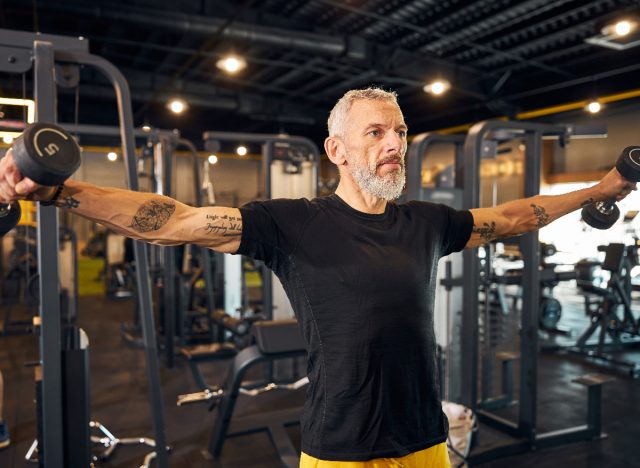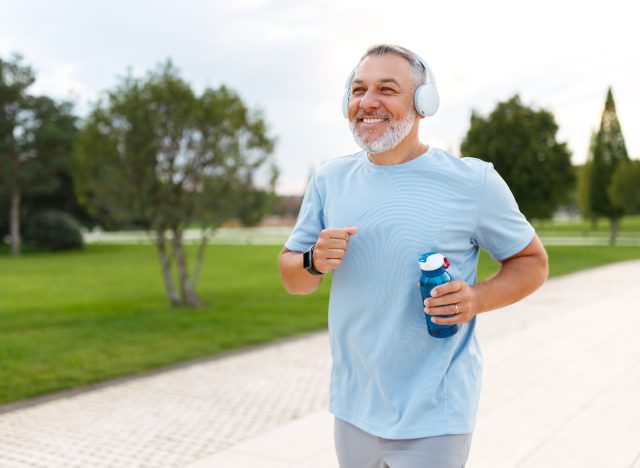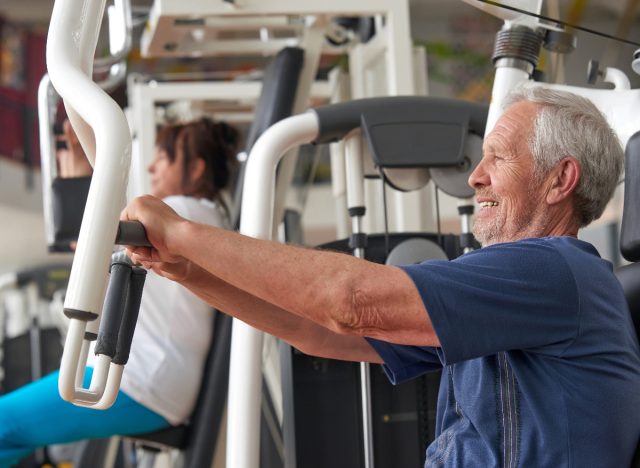The Weight Training Habits That Slow Aging, Science Reveals

Real talk: Weight training is king when it comes to working out. In fact, as you get older, weight training is almost like a magic supplement that’ll help your body stay young. Incorporating weights into your fitness routine is an excellent way to strengthen bone density and muscles and give yourself much more energy. Lifting will help you avoid many injuries that are common as you age. There are so many benefits for your body, and science has a lot to say about the weight training habits that slow aging. Keep reading to learn more.
The more you lift, the younger your body will be.

It’s a fact that your muscles weaken as you age. The progression even has a name—sarcopenia. According to Psychreg, sarcopenia is the reason why elderly people are susceptible to falling, suffering from fractures, and even having difficulty performing daily tasks. The aging process can challenge your lifestyle in a big way, as your ability to complete simple routines can be compromised. The more limited you are with your body as you get older, the more help you will need from others, making you less and less independent. The more you lift weights to strengthen your muscles, the younger your body will be.
Related: The Best Fitness Habits That Slow Aging, Trainer Reveals
Weight training can boost independence in older adults.

The good news? You can improve your muscle strength by as much as 60% by performing four months of weight training, according to research performed at Liverpool Hope University (via Psychreg). “Our study shows that it’s never too late to start lifting weights. The improvement of muscular strength noted in this study is crucial for maintaining older adults’ independence, to enable them to carry out activities of daily living such as climbing stairs, walking to the shop and holding grocery bags,” says Kate Mooney, Ph.D. researcher.
She adds, “Losing mobility is one of the most debilitating issues facing older adults and exercise could help prevent this. Muscle weakness is a common cause of falls and fractures in the elderly and can extend hospitalization and recovery times for older patients. It is also associated with increased risk of mortality in older adults.”
Related: The #1 Strength Workout To Regain Muscle Mass as You Age, Trainer Says
Add aerobic exercise to weight training to prevent age-related diseases.

Mooney stresses the importance of adding aerobic exercise to a regular weight training regimen and says, “Resistance exercise—designed to increase muscle strength as well as functional ability and physical performance—could have a significant impact on prevention of age-related diseases,” adding, “Older adults should be taking part in a combination of weight based training and aerobic exercise, at least two to three times per week, as per NHS recommendations. And it’s never too late to begin.”
It’s great for your heart health.

The next of the weight training habits that slow aging is your heart health will reap the benefits. All you have to do is perform some weight resistance exercises, according to research. In a study performed by Appalachian State University, participants who completed a moderately intense resistance routine for 45 minutes decreased their blood pressure by 20% (via Shape).
A power combo of protein and exercise can help fight muscle fatigue.

The Sarcopenia Ageing Trial, which was published in the European Journal of Applied Physiology (and can be viewed here) involved 100 senior individuals who performed resistance and functional weight training, along with taking various protein supplements, over a four-month period. The research concluded that physical exercise is a powerful tool for the resistance of muscle fatigue for elderly adults.
According to Mooney, the research participants revealed some amazing improvements in muscle strength after the study period (via Psychreg). Their hand grip was stronger, and their total muscle strength improved by 9%. In addition, their leg press strength increased by 45%, bicep curl went up 33%, and chest press performance improved by 60%.
Protein is another key ingredient to add to your regimen, explains Dr. Grace Farhat, lecturer in Food Science and Nutrition at Liverpool Hope University. Dr. Farhat says, “The study concluded that whey protein didn’t enhance the effects of exercise training on muscle strength and function. In fact, if you eat a balanced diet with adequate protein, there is no need for whey protein supplementation,” adding, “The important point is to consume enough protein to support muscle health, for older adults this is approximately 20–30g per meal, or the equivalent of one chicken breast, a tin of tuna or cup of chickpeas.”








